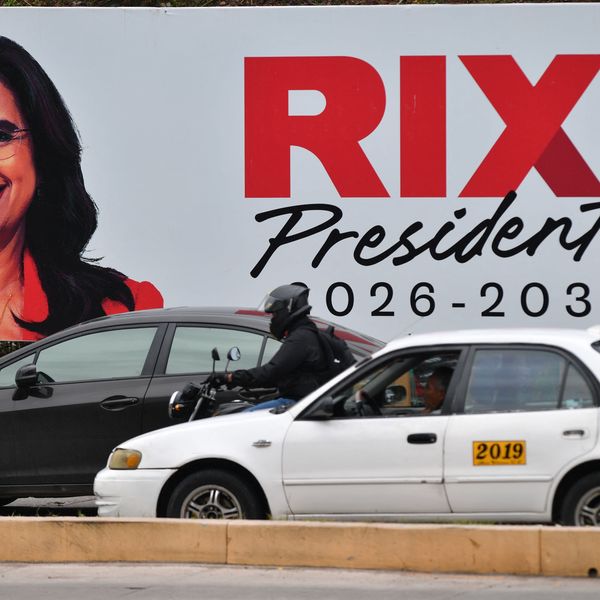Former Honduran President Zelaya's return home Saturday has important implications for the western hemisphere that, we can predict, will be widely overlooked. Zelaya was ousted from the presidency when he was kidnapped at gunpoint by the military on 28 June 2009. Although no hard evidence has yet emerged that the US government was directly involved in his overthrow, the Obama administration did everything it could to help the coup government to survive and then legitimate itself through elections that most of the rest of the hemisphere, and the world, rejected as neither free nor fair.
Zelaya's return represents a partial reversal of that coup d'etat and Washington's efforts to consolidate it, just as President Aristide's return to Haiti after seven years in exile, on 18 March - despite furious efforts by the Obama administration, and even President Obama himself, to prevent it - is a partial reversal of the 2004 US-organised coup that overthrew the democratically elected government of Haiti. And it is another demonstration of how the western hemisphere has changed: the agreement for Zelaya's return was mediated through the governments of Venezuela and Colombia, with no US involvement or even lip-service support until it was over.
Instead, the mediation process had the unanimous support of Latin America and the Caribbean, which endorsed it through their new organisation, Celac (the Community of Latin American and Caribbean States). Celac contains all the countries of the Organisation of American States (OAS) except the US and Canada. It was formed in February 2010, partly as a response to Washington's manipulation of the OAS in the aftermath of the Honduran coup.
The Obama administration lost a lot of trust throughout the hemisphere as a result of its support for the Honduran coup government, and so it was not surprising that US Secretary of State Hillary Clinton was smart enough to endorse the Cartagena agreement (for Zelaya's return) after it was signed. She had been lobbying, without success for the past year and a half, to get Honduras admitted back into the Organisation of American States, from which it was kicked out after the coup. It is assumed that this new accord will pave the way for Honduras' readmission, so she can spin it as a victory for Washington. But it clearly is not.
The agreement met some of the demands of President Zelaya and his allies, but not others. It allows for the participation of the National Front for Popular Resistance, which struggled against the coup and subsequent repression, as a legal political party. It also states that people can organise plebiscites of the kind that Zelaya was overthrown for organising. And it has guarantees for the safety and security not only of Zelaya, but also of others who fled after the coup and remain in exile; it also contains certain non-enforceable human rights guarantees.
And that is the big problem: human rights. Less than a year ago, Human Rights Watch noted that "Honduras has made little progress toward addressing the serious human rights abuses since the 2009 coup." It cited the cases of eight journalists and ten members of the National Front for Popular Resistance who had been murdered since President Porfirio Lobo took office, as well as the impunity for human rights abuses committed by the coup government. If anything, the repression has become worse since then.
Three Honduran journalists have been shot since 11 May; two of them, TV station owner Luis Mendoza and television reporter Francisco Medina, were killed. Paramilitary groups have killed over 40 campesinos since Lobo has been in office. Trade unionists have also been killed, including Ilse Ivania Velasquez Rodriguez, a striking teacher whom Honduran police shot in the face, at close range, with a tear gas canister in March.
The OAS will likely vote on Wednesday to readmit Honduras, but there will be a struggle inside the organisation to attach some conditions. It goes without saying that Washington will push for unconditional readmission. President Correa of Ecuador, himself the victim of a coup attempt in September, has publicly stated his opposition to the readmission of Honduras altogether, partly on the grounds of the impunity granted the people who carried out the coup and post coup repression. Dozens of Honduras' human rights organisations and social movements have similar views.
But it is better to have Zelaya back in the country than outside of it. He will have a voice that can possibly break through the rightwing media monopoly, and if he uses that to oppose the repression there, it can have a positive impact. As elsewhere in the hemisphere, the media - controlled largely by wealthy elites - are a major obstacle to progress. In Honduras, most media organisations supported the coup and promoted the falsehood that Zelaya and his supporters were foreign agents (much like the propaganda of the Arab dictators facing demands for democracy in the Middle East). These themes spilled over to the international media, where they remain visible to this day.
On the positive side, it is good to see Latin American countries taking control of the mediation, with Washington relegated to the sidelines. The biggest mistake they made after the coup was to allow Hillary Clinton, along with Oscar Arias of Costa Rica, to hijack the mediation process. Clinton's goal was the exact opposite of restoring democracy in Honduras, and she succeeded. There will be many struggles ahead for the Honduran pro-democracy movement, and they will need a great deal of solidarity and help from outside, especially in opposing the repression. But this accord is, at least, a step in the right direction.


